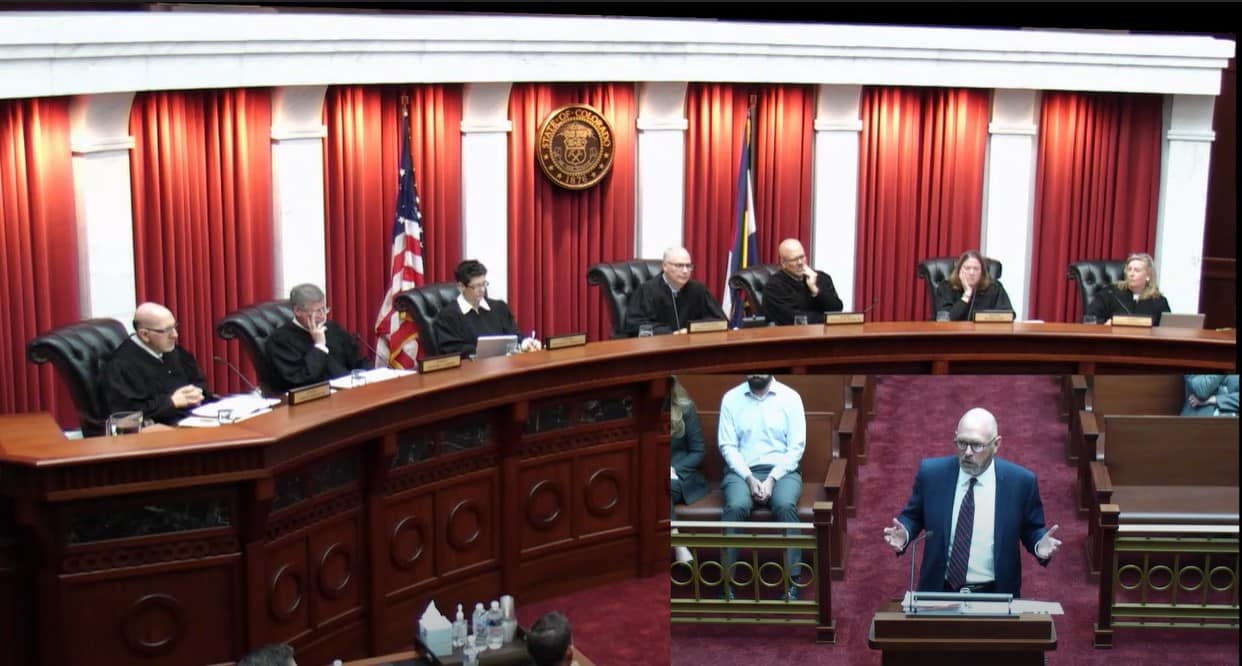
Denver divorce attorney Brenda Storey is fighting to keep her law license. (Photo courtesy of Facebook)
The Colorado Supreme Court will decide in the coming months whether a Denver divorce attorney should lose her law license for one year after she badgered a broke client to pay her, covertly banked a couple’s tax refund check and ignored a judge’s order.
In June 2021, a three-member state disciplinary board determined that Brenda Storey should lose the law license she has had since 1995 for one year and one day. Storey appealed that decision to the Supreme Court, which heard oral arguments last month.
The case, first covered by Colorado Politics, centers around the divorce of Cynthia Sullivan from her husband, Patrick Caldwell Sullivan, between 2018 and 2020. Storey represented Sullivan, the wife. The couple had $3.3 million in assets to split but because Caldwell Sullivan, a real estate agent, was the sole earner, Sullivan was broke by mid-2019.
“You will owe me $40,000 by July 20th, and if it is not paid by someone, I am withdrawing,” Storey wrote to her client on July 2, 2019. She told Sullivan to sell the couple’s furniture and anything else she could. “I do not want to leave you, you need me and my style.”
Sullivan later testified that she was “completely in shock” at Storey’s behavior, since her attorney knew she was “really hurting for money.” Sullivan felt “threatened” by the demands.
“You do not have a choice as to whether you pay me in full. To me, my bill is the highest priority over your sprinkler bill, school supplies, or otherwise,” Storey wrote in another email.
Then, one day in late July 2019, a check arrived at Sullivan’s door. “I am awestruck with the timing of this,” she wrote to Storey, who responded, “I am a big believer that God winks.”
It was an IRS refund check for $47,578. There was only one problem: It was written to both Sullivan and her husband. According to the disciplinary board, Storey didn’t mind.
“You are not speaking with him about this stuff, are you?” the attorney emailed Sullivan on Aug. 6, 2019, referring to the husband. “There is no reason for him to find out about the tax refund just yet.” Sullivan stressed that she had not told Caldwell Sullivan about the check, which Sullivan had signed over to Storey’s law firm earlier that week.
Storey then threatened to withdraw from the case again if Sullivan could not pay the $5,250 she still owed. In an email demanding payment, Storey claimed that if she wasn’t paid, she would have to file financial documents which would show Sullivan had made a large one-time payment and Sullivan’s husband “will be pushing you about from where that money came.” Sullivan later testified that she read the email as a “direct threat” to expose her.
Storey withdrew from the case in September 2019 and mentioned the IRS check to Sullivan’s new attorney, who was so concerned that she called the Colorado Bar Association’s ethics hotline for advice. That attorney, Jennifer Alldredge, then alerted Caldwell Sullivan’s attorney and an Arapahoe County judge ordered Storey to return the money.
“Cynthia Sullivan has never ever paid Brenda Storey,” the latter claimed at an October 2019 hearing, referring to herself in the third person. “She’s never paid me a penny.”
The following January, Storey was again ordered by a judge to hand over the money but didn’t do so until March of 2020, according to the disciplinary board’s decision last year.
In a detailed 35-page ruling, the board determined Storey put her own interest ahead of her clients when she “aggressively pushed Ms. Sullivan to liquidate marital assets”; that she wrongly cashed the IRS check, which was a marital asset, and hid its existence from the husband; and that she violated the judge’s September 2019 order to turn over the money.
Storey, who had never been disciplined during a 25-year career before the Sullivan case, appealed the board’s ruling and proposed punishment to the state’s highest court.
“There is a generally accepted practice in the family law bar that marital assets can be used to pay legal fees while a divorce case is proceeding,” Storey’s attorney, Michael McConnell, told the Supreme Court on June 21, 2021. “Ms. Storey believed when she accepted the funds from the IRS refund, that she was following this generally accepted practice.”
Justin Moore, an attorney with the state’s Office of Attorney Regulation Counsel, disputed that: “Ms. Storey did not engage in a generally accepted practice. Her argument attempts to make a generally accepted practice fit her own dishonest, selfish conduct.”
Justice William Hood seemed skeptical of Moore’s claim that Storey’s forceful emails amounted to a violation of the rules of professional conduct for attorneys.
“We may look at snippets and say, ‘That seems reprehensible’ or, ‘That seems too belligerent,’” Hood told Moore, “but it feels at times like you’re asking us to have her pilloried in front of the court for using language that most of us would find unacceptable.”
Justice Melissa Hart, however, was highly critical of Storey’s behavior in the Sullivan case.
“What reason,” she asked McConnell, “could an attorney have for thinking, under our system, that undisclosed marital assets could be used to pay” a client’s bills?

Denver divorce attorney Brenda Storey is fighting to keep her law license. (Photo courtesy of Facebook)
The Colorado Supreme Court will decide in the coming months whether a Denver divorce attorney should lose her law license for one year after she badgered a broke client to pay her, covertly banked a couple’s tax refund check and ignored a judge’s order.
In June 2021, a three-member state disciplinary board determined that Brenda Storey should lose the law license she has had since 1995 for one year and one day. Storey appealed that decision to the Supreme Court, which heard oral arguments last month.
The case, first covered by Colorado Politics, centers around the divorce of Cynthia Sullivan from her husband, Patrick Caldwell Sullivan, between 2018 and 2020. Storey represented Sullivan, the wife. The couple had $3.3 million in assets to split but because Caldwell Sullivan, a real estate agent, was the sole earner, Sullivan was broke by mid-2019.
“You will owe me $40,000 by July 20th, and if it is not paid by someone, I am withdrawing,” Storey wrote to her client on July 2, 2019. She told Sullivan to sell the couple’s furniture and anything else she could. “I do not want to leave you, you need me and my style.”
Sullivan later testified that she was “completely in shock” at Storey’s behavior, since her attorney knew she was “really hurting for money.” Sullivan felt “threatened” by the demands.
“You do not have a choice as to whether you pay me in full. To me, my bill is the highest priority over your sprinkler bill, school supplies, or otherwise,” Storey wrote in another email.
Then, one day in late July 2019, a check arrived at Sullivan’s door. “I am awestruck with the timing of this,” she wrote to Storey, who responded, “I am a big believer that God winks.”
It was an IRS refund check for $47,578. There was only one problem: It was written to both Sullivan and her husband. According to the disciplinary board, Storey didn’t mind.
“You are not speaking with him about this stuff, are you?” the attorney emailed Sullivan on Aug. 6, 2019, referring to the husband. “There is no reason for him to find out about the tax refund just yet.” Sullivan stressed that she had not told Caldwell Sullivan about the check, which Sullivan had signed over to Storey’s law firm earlier that week.
Storey then threatened to withdraw from the case again if Sullivan could not pay the $5,250 she still owed. In an email demanding payment, Storey claimed that if she wasn’t paid, she would have to file financial documents which would show Sullivan had made a large one-time payment and Sullivan’s husband “will be pushing you about from where that money came.” Sullivan later testified that she read the email as a “direct threat” to expose her.
Storey withdrew from the case in September 2019 and mentioned the IRS check to Sullivan’s new attorney, who was so concerned that she called the Colorado Bar Association’s ethics hotline for advice. That attorney, Jennifer Alldredge, then alerted Caldwell Sullivan’s attorney and an Arapahoe County judge ordered Storey to return the money.
“Cynthia Sullivan has never ever paid Brenda Storey,” the latter claimed at an October 2019 hearing, referring to herself in the third person. “She’s never paid me a penny.”
The following January, Storey was again ordered by a judge to hand over the money but didn’t do so until March of 2020, according to the disciplinary board’s decision last year.
In a detailed 35-page ruling, the board determined Storey put her own interest ahead of her clients when she “aggressively pushed Ms. Sullivan to liquidate marital assets”; that she wrongly cashed the IRS check, which was a marital asset, and hid its existence from the husband; and that she violated the judge’s September 2019 order to turn over the money.
Storey, who had never been disciplined during a 25-year career before the Sullivan case, appealed the board’s ruling and proposed punishment to the state’s highest court.
“There is a generally accepted practice in the family law bar that marital assets can be used to pay legal fees while a divorce case is proceeding,” Storey’s attorney, Michael McConnell, told the Supreme Court on June 21, 2021. “Ms. Storey believed when she accepted the funds from the IRS refund, that she was following this generally accepted practice.”
Justin Moore, an attorney with the state’s Office of Attorney Regulation Counsel, disputed that: “Ms. Storey did not engage in a generally accepted practice. Her argument attempts to make a generally accepted practice fit her own dishonest, selfish conduct.”
Justice William Hood seemed skeptical of Moore’s claim that Storey’s forceful emails amounted to a violation of the rules of professional conduct for attorneys.
“We may look at snippets and say, ‘That seems reprehensible’ or, ‘That seems too belligerent,’” Hood told Moore, “but it feels at times like you’re asking us to have her pilloried in front of the court for using language that most of us would find unacceptable.”
Justice Melissa Hart, however, was highly critical of Storey’s behavior in the Sullivan case.
“What reason,” she asked McConnell, “could an attorney have for thinking, under our system, that undisclosed marital assets could be used to pay” a client’s bills?

